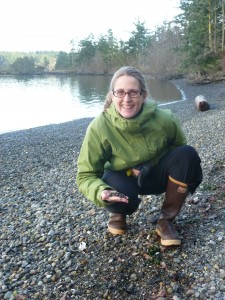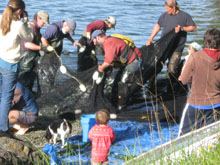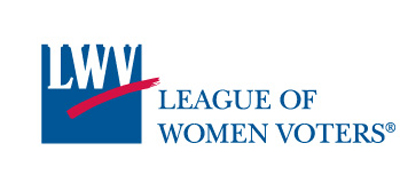— from Tina Whitman and Randy O’Bryan —
 Local smelt fishermen, researchers and concerned residents are working together to urge the Washington Department of Fish and Wildlife to invest in essential research into the status of surf smelt stocks and to protect spawning beaches.
Local smelt fishermen, researchers and concerned residents are working together to urge the Washington Department of Fish and Wildlife to invest in essential research into the status of surf smelt stocks and to protect spawning beaches.
This spring, the Washington Department of Fish and Wildlife (WDFW) set out a proposed rule change that could change recreational and commercial harvest of surf smelt. Surf smelt, small schooling fish, provide important food for a wide variety of animals, including seabirds, fish and marine mammals. After hearing concerns about conflicting uses down-sound from shoreline property owners and commercial and recreational fishers, WDFW proposed three options to change harvest regulations for surf smelt, including full closure of commercial harvest and reduction in recreational harvest.
We appreciate WDFW’s attention to protecting surf smelt, but the agency needs to take two other steps in conjunction with any proposed changes to harvest rules. First, we need to learn just how many smelt swim in the Salish Sea, and whether current harvests threaten those fish. WDFW completed the most recent smelt stock assessment back in the mid-1990s, when it concluded that 1% of the smelt were being harvested. In the absence of updated fish population data, it is difficult to evaluate the three alternatives proposed by the rule change.
In addition, the proposed rules risk eliminating one of the few remaining long-term fishing traditions in San Juan County, and further disconnecting us from the natural environment. Instead, we encourage the Fish and Wildlife Commission to direct the WDFW to devote the necessary resources to assessing surf smelt populations and trends in San Juan County and throughout the Salish Sea.
Second, we encourage WDFW to improve its protection of spawning habitat. If ongoing shoreline modifications such as hard rock bulkheads continue to be allowed at known spawning beaches, it will undermine any efforts to safeguard the stock using harvest limitations or fishing restrictions. By protecting spawning sites, WDFW can help ensure the health of the fishery at this most critical stage.
The public is welcome to comment on this issue through May 30, 2014 at https://wdfw.wa.gov/fishing/regulations/smelt/
Randy O’Bryant is a commercial smelt fisherman from Lopez Island
Tina Whitman is a forage fish researcher and Science Director at FRIENDS of the San Juans.
**If you are reading theOrcasonian for free, thank your fellow islanders. If you would like to support theOrcasonian CLICK HERE to set your modestly-priced, voluntary subscription. Otherwise, no worries; we’re happy to share with you.**








